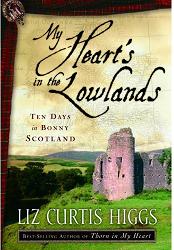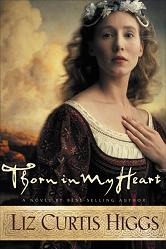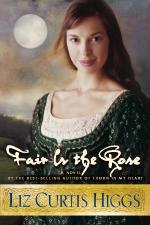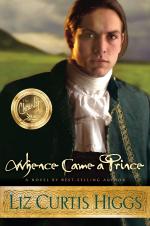 Liz Curtis Higgs is the author of twenty-four books, with more than three million copies in print. In her series of best-selling Bad Girls of the Bible books, Liz Curtis Higgs breathes new life into ancient tales about the most infamous—and intriguing—women in scriptural history. Her best-selling historical novels, which transport the stories of Rebecca, Leah, Rachel, and Dinah to eighteenth-century Scotland, also help readers see these familiar characters in a new light.
Liz Curtis Higgs is the author of twenty-four books, with more than three million copies in print. In her series of best-selling Bad Girls of the Bible books, Liz Curtis Higgs breathes new life into ancient tales about the most infamous—and intriguing—women in scriptural history. Her best-selling historical novels, which transport the stories of Rebecca, Leah, Rachel, and Dinah to eighteenth-century Scotland, also help readers see these familiar characters in a new light.
As a gifted speaker, Liz has presented more than 1,500 encouraging programs for audiences both nationally and internationally. She received the Council of Peers Award for Excellence from the National Speakers Association, becoming one of only thirty women in the world named to their Speaker Hall of Fame.
~Interview conducted via telephone by Jessica Dotta, 2006~
Can you tell us what book or project you are coming out with next? I have a book coming out in February, it's called My Heart's in the Lowlands, Ten Days in Bonny Scotland, and yes we're going to go to Scotland, but not with a fictional story but with a true one. It is me, taking you with me on one of my many trips to Scotland. We spend ten days going about Galloway in this book, going to all the places that my characters have lived and breathed in, at least in our imaginations, and getting to know modern Scotland. It was so fun to write and that's coming out in February 2007.
I have a book coming out in February, it's called My Heart's in the Lowlands, Ten Days in Bonny Scotland, and yes we're going to go to Scotland, but not with a fictional story but with a true one. It is me, taking you with me on one of my many trips to Scotland. We spend ten days going about Galloway in this book, going to all the places that my characters have lived and breathed in, at least in our imaginations, and getting to know modern Scotland. It was so fun to write and that's coming out in February 2007.
As far as novels go, I am freshly back from Edinburgh, where I did research for the next trilogy, which releases in March 2008 with Here Burns My Candle. We're going to back up the time a little bit. It's 1745 when the first novel begins, when Bonny Prince Charles shows up in Edinburgh and turns the town upside down. The story will begin there and probably cover a couple of years. You never know until you're in the writing, at least I never do, how much ground we're going to cover as far as days, months, years. It's always a surprise to me.
You haven't started this novel yet then?
I'm at the research stage for it. I have not actually written page one yet, but that's the next one coming. March 2008 for that one.
Are you a plotter or seat of the pants writer?
[Laughs] I always love that seat of the pants when I'm a woman who never wears pants. By the hem of the skirt, aye? I guess I'll have to compare notes with other writers to give you a definitive answer.
On the one hand, I do plot big picture stuff, then during the writing process, I tend to say in this chapter, this is going to happen—here's the goal of the chapter. What I don't know is how that's going to happen. That is always the surprise to me. So, I don't know whether I'm a plotter or a hem of the skirt writer, but I guess it's sort of a combo of both.
Is it true that you knew for the first time that you were going to write fiction while reading a Jack Cavanaugh novel?
Yes, I read Jack Cavanaugh's series and was just blown away by the power of his writing and his ability to communicate faith in a fictional context. I'm a huge reader of fiction, but up until then had only read general market fiction. His was the first Christian novel I ever read, soon followed by The Mark of the Lion series by Francine Rivers. I started out with two of the very best and was immediately captured by their stories, and what could be accomplished for the Kingdom in a fiction setting. That's when God whispered to my heart 'Scottish Historical Fiction.'
That was 1995, quite a while ago now. And I just thought, that can't be the Lord, that doesn't make any sense. At that point, I'd never been to Scotland, I'd gotten a C in History in high school and college, and I had yet to write a novel—or even a short story as an adult writer. I did it as a kid, but I'd not written fiction as a writer, ever.
The very concept was 'Surely, Lord, you've whispered into the wrong ear. How could that be what you're calling me to do?' But I dutifully went to Scotland in 1996. No idea what story I was going to tell, but knowing I better get there to find out what the story was.
I went in 1996, twice in 1998, in 2000, and in 2002 before I knew categorically what the story would be.
So just on the faith of: 'I know I'm supposed to write about it, so I'm going to go?'
That's right. I'm going to do the research. I'm going to buy books. I have a ridiculous number—825 books about Scotland. They completely overwhelm my office. I've been to Scotland nine times now, and two more times beyond that to England. I just kept doing research. I have the right husband, because he was willing to let me spend my frequent flyer miles to keep going to Scotland and coming home with books and saying 'Wow, it's going to be a great place to put a story when I know what the story is.'
Of course the other key is, between 1995 and 2003 when Thorn in My Heart was published, I wrote and published 15 other books. So it wasn't like I was goofing off. I was just waiting for the word from the Lord—'Now.'
I needed those years of maturity, both in my life, my spiritual life, and also in my writing life. I'm very grateful looking back that it took that long. But I gotta tell you, through the process, it was getting kind of embarrassing. [Mimicking voice] "You're going to Scotland, again?"
[Laughing.] That's really good what you said about how you needed the maturity as a woman. Your fiction doesn't shy away from taboo topics. It doesn't shy away from issues. In my opinion, it breaks new ground. What's your theory on writing? Can you expand on what your goal is, and why you allow deeper issues into your fiction?
Well, that's really where our spiritual life is tested, I think, when we go deeper. I wrote two contemporary novels back at the end of the century. They were light and fun and I had a ball writing them, but when you write light, you can't go deep too—at least that's my personal experience. You've got to choose what your tone is going to be. In my case, I wanted to be more dramatic, I wanted to go deeper. So I had to leave behind that lighter, comedic touch and just go as deep as the story needed to go. Of course it's based on Leah, Jacob and Rachel from the Old Testament—an R rated story if ever there was one. In many ways, I am less . . . let me try to think of how I want to say this, my material is not as shocking as the biblical material. Let's put it that way. Jacob ends up with four women, at least I don't have my Jamie having an affair with Annabel and Eliza as well as the two women, Rose and Leana. If anything, I toned down that element for my fiction. I felt the love triangle was painful enough, was going to pull at our hearts hard enough, without having to add the other elements.
In my case, I wanted to be more dramatic, I wanted to go deeper. So I had to leave behind that lighter, comedic touch and just go as deep as the story needed to go. Of course it's based on Leah, Jacob and Rachel from the Old Testament—an R rated story if ever there was one. In many ways, I am less . . . let me try to think of how I want to say this, my material is not as shocking as the biblical material. Let's put it that way. Jacob ends up with four women, at least I don't have my Jamie having an affair with Annabel and Eliza as well as the two women, Rose and Leana. If anything, I toned down that element for my fiction. I felt the love triangle was painful enough, was going to pull at our hearts hard enough, without having to add the other elements. One of the challenges is speaking to the biblical story, and yet when necessary because of it being in 18th century Scotland, changing the biblical and following the historical. What that means is you have readers who say 'Well, she didn't follow the biblical story exactly' and the historical reader who says, 'Well, I'm sorry she followed the biblical story so exactly.' That's the risk that you take. Any time that you write honestly, where God says go, you're going to have some reader unhappy with you. But I would rather have them unhappy with me because I moved them emotionally, and that's when I hear about it. They're unhappy because I got to them—or more importantly the story got to them. I try to say in the background.
One of the challenges is speaking to the biblical story, and yet when necessary because of it being in 18th century Scotland, changing the biblical and following the historical. What that means is you have readers who say 'Well, she didn't follow the biblical story exactly' and the historical reader who says, 'Well, I'm sorry she followed the biblical story so exactly.' That's the risk that you take. Any time that you write honestly, where God says go, you're going to have some reader unhappy with you. But I would rather have them unhappy with me because I moved them emotionally, and that's when I hear about it. They're unhappy because I got to them—or more importantly the story got to them. I try to say in the background. That is definitely a huge goal for me, to move my readers at the deepest level they're willing to be moved. Some people choose not to read fiction that really makes them work, as it were. I throw in Scotch words, so there's a glossary in the back . . . I try to keep it all in context so that I don't make my readers work harder than they have to. But the reality is, I wanted to write something that stretches us a little, that gives us some insight into another time and place, rather than just sticking everybody in a long dress and in a carriage. I wanted to do the research and bring that element in, the good and the bad. The only thing I refused to embrace was that in 1788-89-90 when my trilogy was set, people took a bath once a year. I am not going there. We know it was a reality, but do we have to put it on the page?
That is definitely a huge goal for me, to move my readers at the deepest level they're willing to be moved. Some people choose not to read fiction that really makes them work, as it were. I throw in Scotch words, so there's a glossary in the back . . . I try to keep it all in context so that I don't make my readers work harder than they have to. But the reality is, I wanted to write something that stretches us a little, that gives us some insight into another time and place, rather than just sticking everybody in a long dress and in a carriage. I wanted to do the research and bring that element in, the good and the bad. The only thing I refused to embrace was that in 1788-89-90 when my trilogy was set, people took a bath once a year. I am not going there. We know it was a reality, but do we have to put it on the page?
The first and foremost thing is the character themselves, to create them in a believably enough [manner.] They're certainly real to me, I can only hope they're real to my readers. In fact, that's the hardest part of finishing a long trilogy. I was with these folks for three long years with the trilogy, and of course Jamie and Leana in Grace in Thine Eyes. It's like having members of your family with you, living under your roof for years, and then they leave. They no longer exist except in my heart and on the page. But I, of course, want to know what they're doing now. [Laughs.]
Do you ever find yourself not putting something you want in your novel because you're afraid of how your reader may react?
To be continued next Friday...
Friday, December 08, 2006
Home »
» A Chat with Liz Curtis Higgs ~ Part I
A Chat with Liz Curtis Higgs ~ Part I
Friday, December 08, 2006
12 comments























Jessica: great interview! Thanks Ane, for setting it up.
ReplyDeleteLiz, you are truly an encouragement like your website says. You touched my heart at the ACFW conference. Thank you so much for giving us this interview and for who you are.
Jack Cavanaugh is absolutely amazing. You have good taste. You know what other historical novelist is amazing? Your interviewer, Jessica Dotta. No smoke. She's written a trilogy that in my opinion is the Gone With the Wind of our time, er, of Victorian time.
Now, to get a publisher to see that. (shameless plug over).
Anyway, thank you so much for all that you are and do, Liz. Even your smile blesses me!
Loving this interview. Can't wait for its conclusion. Liz, you were a wonderful blessing and encouragement at the conference in Dallas. God bless!
ReplyDeleteGreat interview, all. Thanks for the words of wisdom, Liz. God bless--
ReplyDeleteLiz, thank you so much for agreeing to the interview. You are one amazing lady!
ReplyDeleteGina, how much did we agree on again? ; -) Ane, I'm not paying you too, unless I see it.
Seriously, thank you. That was sweet.
Wonderfully fun and deep. Thanks for posting this, gals. Liz, you are a blessing to me.
ReplyDeleteMary DeMuth
Liz, you have inspired me so much, its' time to say THANK YOU! Like you, I've had to wait for the maturity to write. Sheesh. I'm not good at waiting. ;) But I'm finally writing.
ReplyDeleteJessica, Gina said it, so pay her. :o)
Thanks!
ReplyDeleteGreat interview. And Liz, your sessions at ACFW were so excellent. You made me laugh a lot and cry a bit, too.
Thanks for letting your light shine bright and beautiful.
I had the chance to see Liz live in person at my local library recently, and she seemed like such a fun lady. Glad to have had the chance to hear you speak, Liz.
ReplyDeleteLiz, I said this to you before and I mean it still--you are amazing! God has blessed me beyond measure by allowing me to chat with you, learn from you, laugh and cry with you. Encourager and role model, that's what you've been to me. May you be even more richly blessed in return. Thank you!
ReplyDeleteAbundant blessings,
Jenny Cary
Liz, it was great seeing you at your Nashville signing. Thanks for your constant honesty and encouragement to writers. I can't wait to read about your ten days in Bonny Scotland.
ReplyDeleteExcellent interview, Jessica and Liz. The book about Scotland sounds wonderful! Will make a good birthday gift for my hubby!
ReplyDeleteAnd ditto to what others have said, Liz, about your being awesome in Dallas. You were God's mouthpiece to remind me of much needed and encouraging truth. Thank you.
Oh, and dittos, too, to what Gina said about your interviewer's trilogy. I stayed up way past bed time reading Jessica's first novel, and the second one is just as captivating.
God bless you both!
Reni
Here's to hem of the skirt writers! :) Liz, I definately have to check out your books now, as I love Scottish history, and just wish that I could traipse over there to research a book to write... :) I like the idea of putting biblical stories into a historical context - new twist on old stories, make us think about them a bit more.
ReplyDelete